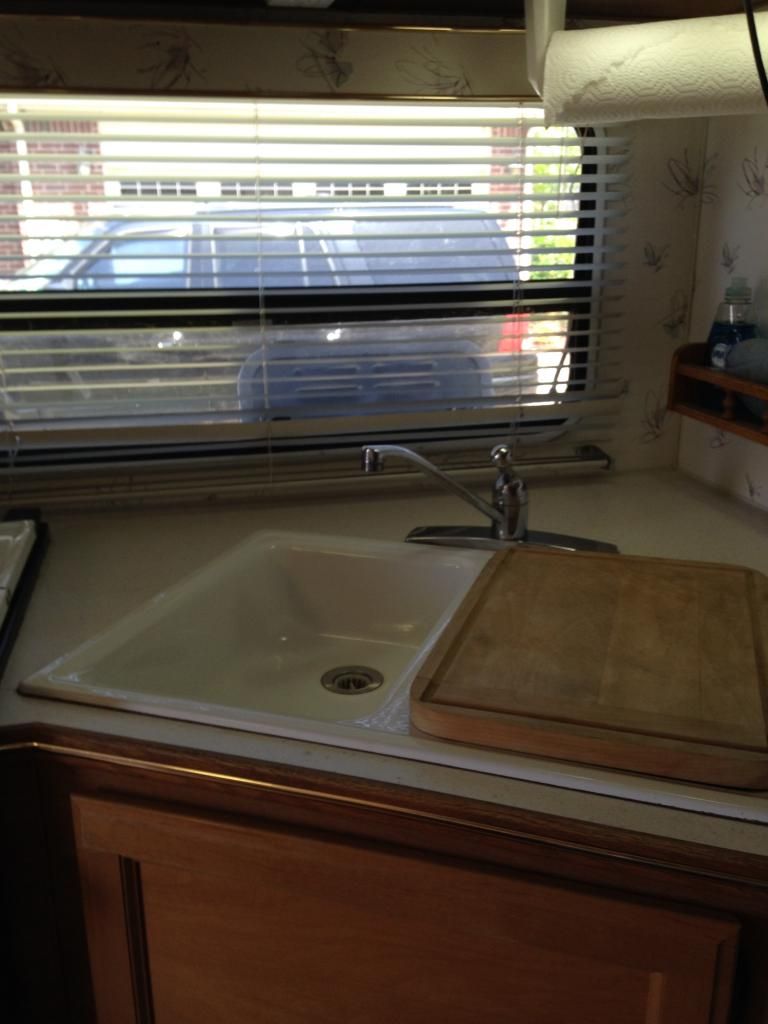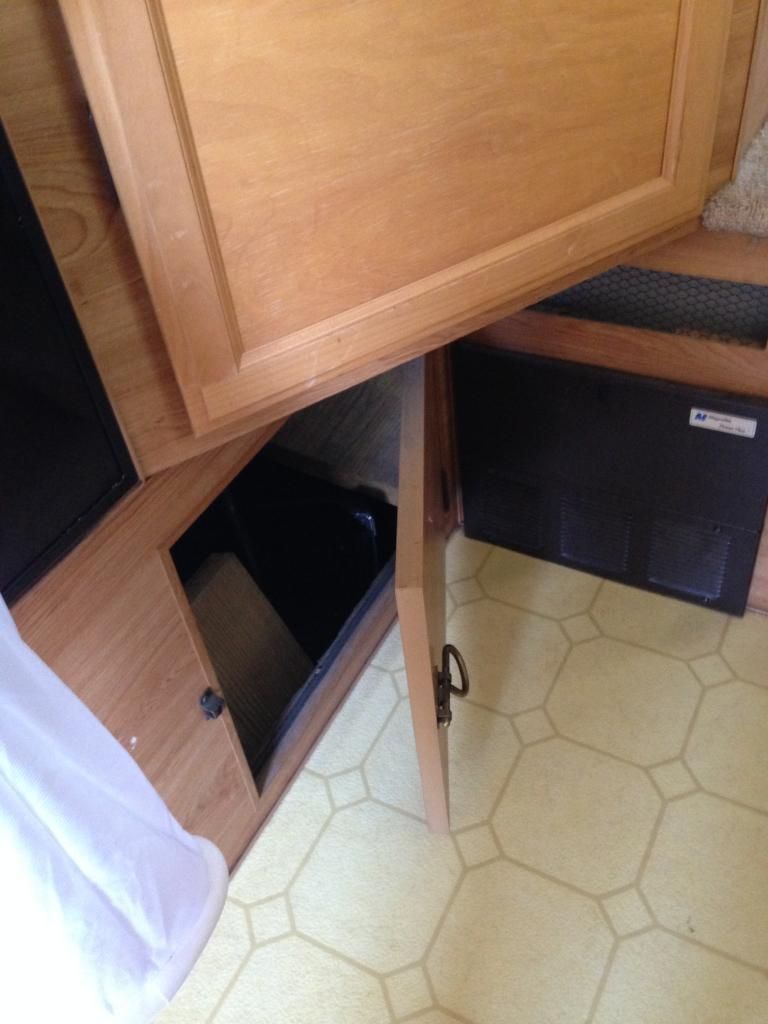- Good Sam Community
- Groups
- Travel Trailer Group
- Forum
- Re: Adding another 12 volt Battery
- Subscribe to RSS Feed
- Mark Topic as New
- Mark Topic as Read
- Float this Topic for Current User
- Bookmark
- Subscribe
- Mute
- Printer Friendly Page
Adding another 12 volt Battery
- Mark as New
- Bookmark
- Subscribe
- Mute
- Subscribe to RSS Feed
- Permalink
- Report Inappropriate Content
Aug-23-2014 09:26 AM


 Gets chilly up there at night in October. It has outside battery compartment with disconnect switch but only room for one. Have outside access storage door that accesses truck bed in front of wheel well that is almost directly under battery compartment. Also have generator compartment on other side of camper in passage side rear compartment but seems to be no wiring there. Any info, pics, or threads would be appreciated.
Gets chilly up there at night in October. It has outside battery compartment with disconnect switch but only room for one. Have outside access storage door that accesses truck bed in front of wheel well that is almost directly under battery compartment. Also have generator compartment on other side of camper in passage side rear compartment but seems to be no wiring there. Any info, pics, or threads would be appreciated.
- Labels:
-
Truck Campers
- Mark as New
- Bookmark
- Subscribe
- Mute
- Subscribe to RSS Feed
- Permalink
- Report Inappropriate Content
Aug-31-2014 05:50 PM
wintersun wrote:
First I would measure the battery compartment and consider replacing what looks like a Group 24 battery with a Group 31 battery. It should be all that is needed to provide extra capacity.
The furnace blower motor, being a motor, is very energy efficient. Change out your camper lights for LED ones and you will reduce consumption much more than the furnace motor can begin to consume.
Biggest power drains are usually the lights, the fridge, CO2 monitor, TV.
uhmmm...no...you have that backwards...the furnace fan motor is indeed the greatest consumer of power in the TC systems.
Eagle Cap 850
25'Airstream Excella
"Good People Drink Good Beer"-Hunter S Thompson
- Mark as New
- Bookmark
- Subscribe
- Mute
- Subscribe to RSS Feed
- Permalink
- Report Inappropriate Content
Aug-31-2014 05:11 PM
The furnace blower motor, being a motor, is very energy efficient. Change out your camper lights for LED ones and you will reduce consumption much more than the furnace motor can begin to consume.
Biggest power drains are usually the lights, the fridge, CO2 monitor, TV.
- Mark as New
- Bookmark
- Subscribe
- Mute
- Subscribe to RSS Feed
- Permalink
- Report Inappropriate Content
Aug-30-2014 03:44 PM
I added another battery in front of wheel arch -----but to improve charging when travelling I fitted much heavier cables from the truck batteries, this has made a huge difference to charging-----I fitted a manually controlled relay so that I can pinch a bit of power if the camper is running low. I can now run with the 'fridge on 12volt while travelling---first time since owning the truck/camper.
I connected the new charge cables with Anderson plug to enable camper to be removed (but in general it stays on the truck).
I also fitted Anderson plug on outside near dump point to run a macerator----dumping tanks is not as simple for us in Europe as it is in US---we sometimes have to pump a distance into a public toilet etc.--(we wild camp (boon-dock) most of the time so don't use campsite dumps.
Nigel & Pamala---UK
- Mark as New
- Bookmark
- Subscribe
- Mute
- Subscribe to RSS Feed
- Permalink
- Report Inappropriate Content
Aug-29-2014 12:58 PM
poncho62 wrote:
My GMC pickup has a 2nd battery tray under the hood. I put an RV battery there with an isolating solenoid. This keeps that battery and the trailer battery separate from the truck engine battery, but the alternator still charges them when needed
Our pickup truck has a space for a second battery. I can buy an isolator and then have 12V available at the hitch receptacle.
If one seriously depletes the TT coach battery, should I take that battery out of the system and then use the auxiliary battery under the hood? I presume that is how it is done. Should I just put a knife switch on the coach battery?
Connecting two batteries of a different design in parallel creates problems, IIRC. If the two were in parallel, some charge would move to the depleted battery, then I don't know what would happen.
- Mark as New
- Bookmark
- Subscribe
- Mute
- Subscribe to RSS Feed
- Permalink
- Report Inappropriate Content
Aug-25-2014 07:51 PM
For $85 I think it's a bargain.
- Mark as New
- Bookmark
- Subscribe
- Mute
- Subscribe to RSS Feed
- Permalink
- Report Inappropriate Content
Aug-25-2014 06:19 PM

- Mark as New
- Bookmark
- Subscribe
- Mute
- Subscribe to RSS Feed
- Permalink
- Report Inappropriate Content
Aug-24-2014 04:42 PM
- Mark as New
- Bookmark
- Subscribe
- Mute
- Subscribe to RSS Feed
- Permalink
- Report Inappropriate Content
Aug-24-2014 02:48 PM
It's true that when batteries are not of the same age, the older one will prolly shorten the life of the newer one. So if your present battery is three or more years old, I'd recommend getting two batteries type 27 or better. We find AGM's are completely trouble free, if your planning to use your rig frequently.
2004 F350 Diesel CC SRW 19.5" Rickson W/T 4WD
2005 Lance 1121 well found.
See us on YouTube" Living the Lance Life" 3 of 4. Google skip bosley for TR's: Alaska, Assateague Island, Disney World & Fla Keys and a California Coastal jaunt.
- Mark as New
- Bookmark
- Subscribe
- Mute
- Subscribe to RSS Feed
- Permalink
- Report Inappropriate Content
Aug-24-2014 02:27 PM
2oldnslow wrote:Save your money and just purchase them at your nearest NAPA/AutoZone or any auto or marine supply store.
Putting the second battery ahead of the wheel well looks like the easiest way to go. Use at least 6AWG wire (4 or 2 would be better) to connect the two batteries. Put a pair of Anderson Powerpole connectors in line so you can disconnect the second battery to off-load the camper.
Source for Anderson Powerpoles:
http://www.powerwerx.com/anderson-powerpoles/powerpole-sets/sb120-sb-series-120-amp.html
tony lee wrote:Excellent advice and one I share often too. When one is not using the batteries frequently and are subject to Harsh use (S.O.C. below 12.1v) and infrequent charging fully, you are better off having a battery that won’t hurt as much when you learn you have just killed it. An $80 battery compared to a $400 battery is a substantial hit when they are not well cared for.
Nothing really wrong with the battery and you could just get another one the same to put in parallel.
Sure it isn't a true deep cycle or a legendary golf-cart battery, but for most owners not using their RVs full-time, these sort of batteries probably represent pretty good value for money - especially when they are often not looked after properly and rarely hooked to a quality charger capable of bringing them to close to 100% charged. They can last 3 years if looked after and then replaced cheaply - which is better than getting expensive batteries that may only last the same time if not looked after.
~DJ~ wrote:DJ brings up an important point. One should verify the dates on the battery or make sure they purchase batteries all at the same time and same manufacturing date code.
Something I've always heard. If you are going to run 2 batteries they should be within 3 months of age of each other.
Batteries are slowly diminishing with each use (cycle). Much like a Jar of Water. Each use you take a sip of the water and over a couple of years the Jar is not as full. Then you add another Jar alongside the older Jar, and they are hooked up to run together, they will only charge up to the level of the highest level of the old jar. Wasting all the additional charge ability level in the new Jar.
Also, you might find a pair of AGM batteries are able to be stuffed into your battery compartment on their sides. Allowing you to use the existing location and get more distance in your camping. This link is a good one to check this opportunity out; Mello Mike's Battery Upgrade Link Clicky
Having a dead battery on a very cold morning is a sad way to begin your day.
b
09 Lance 1191
1,560wSolar~10-6vGC2-1,160AmpH~Tri-Star-Two(2)60/MPPT~Xantrex 2000W
300wSolar~2-6vAGM-300AmpH~Tri-Star45/MPPT~Xantrex 1500W
16 BMW R1200GSW Adventure
16 KTM 500 EXC
06 Honda CRF450X
09 Haulmark Trlr
- Mark as New
- Bookmark
- Subscribe
- Mute
- Subscribe to RSS Feed
- Permalink
- Report Inappropriate Content
Aug-24-2014 01:54 PM
'12 Northstar Liberty on a '16 Super Duty 6.2. Twin 6 volt AGMs with 300 watts solar.
- Mark as New
- Bookmark
- Subscribe
- Mute
- Subscribe to RSS Feed
- Permalink
- Report Inappropriate Content
Aug-24-2014 01:49 PM
Sure it isn't a true deep cycle or a legendary golf-cart battery, but for most owners not using their RVs full-time, these sort of batteries probably represent pretty good value for money - especially when they are often not looked after properly and rarely hooked to a quality charger capable of bringing them to close to 100% charged. They can last 3 years if looked after and then replaced cheaply - which is better than getting expensive batteries that may only last the same time if not looked after.
Lots of photos with comprehensive captions at MY PICASA Album
Spotwalla map of our travels - Our Travel map
- Mark as New
- Bookmark
- Subscribe
- Mute
- Subscribe to RSS Feed
- Permalink
- Report Inappropriate Content
Aug-24-2014 01:39 PM
- Mark as New
- Bookmark
- Subscribe
- Mute
- Subscribe to RSS Feed
- Permalink
- Report Inappropriate Content
Aug-24-2014 12:09 PM
billyray50 wrote:
How would you run the wires to house battery? Should i drill into bottom of battery compartment to run cables to set up in parallel or less invasive way to battery compartment.
Drill into the battery box only if you have to, and seal the holes well when finished. Look for a place you can tie into the existing battery cables outside the box if you can. The fuse block in the converter box is a good possibility.
Don't forget to put an inline fuse near the positive terminal of the second battery.
1998 Lance 845
320AHr Battery Bank
400W Solar Array
Morningstar ProStar 30 PWM Controller
NovaKool R5810 5.8cf 12VDC Refridgerator (best mod ever!)
- Mark as New
- Bookmark
- Subscribe
- Mute
- Subscribe to RSS Feed
- Permalink
- Report Inappropriate Content
Aug-24-2014 09:20 AM
2oldman wrote:
Looks like you have the wrong kind of battery there now.
Good catch, looks like a CCA...take that out and get the largest deep cell you can fit in there...that should do you for a night or two running the furnace.
Eagle Cap 850
25'Airstream Excella
"Good People Drink Good Beer"-Hunter S Thompson





